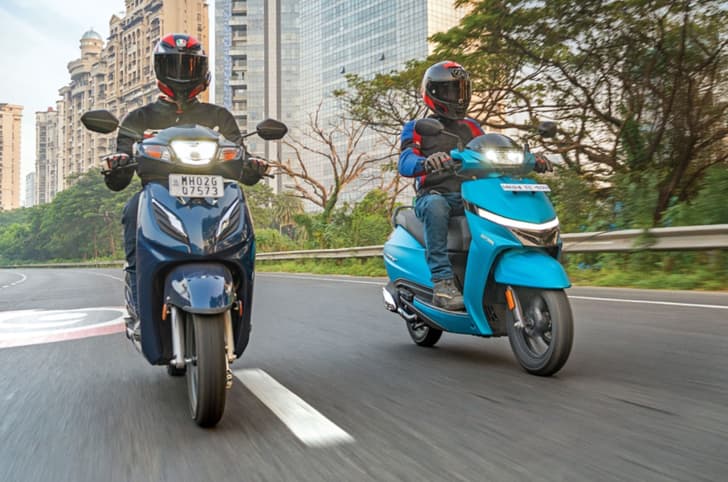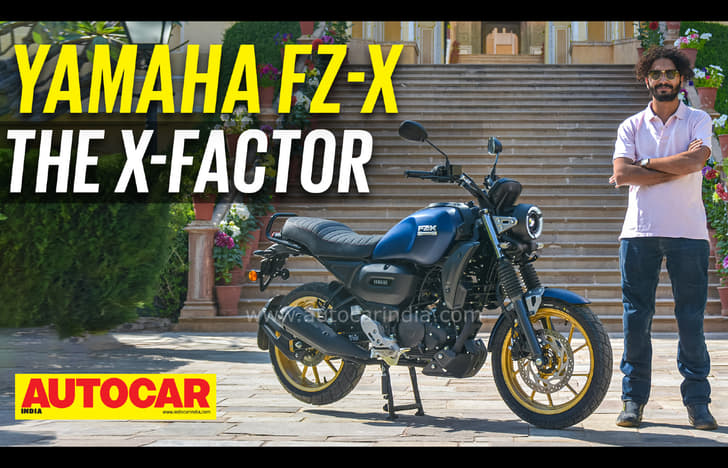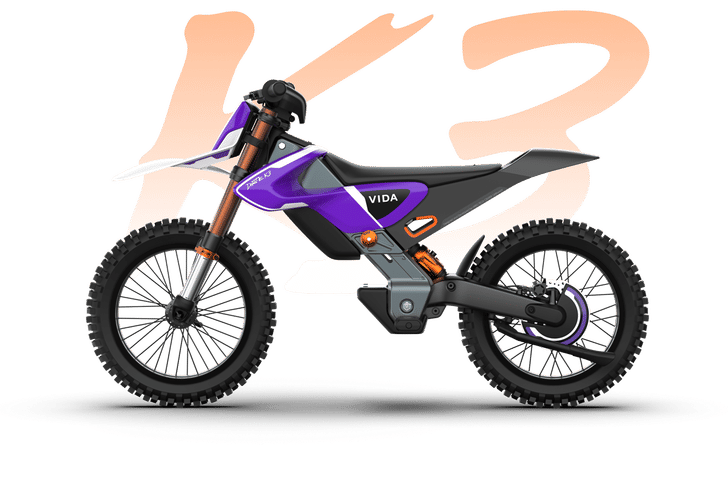The right way to go about your formative years in motorcycling is to start on more docile, small displacement machines, and gradually move your way up the cubic capacity ladder as you improve your skill set. Along that path, the 300-400cc segment represents something of a coming of age for the Indian motorcyclist – this is where things start to get a little serious. If you’re fishing for a sportbike in this pond today, two of the biggest catches are the KTM RC 390 and the TVS Apache RR310. Both bikes have been duking it out for some years now, and both have seen recent updates, with the KTM’s being a proper generation shift. Here’s how they stack up today.
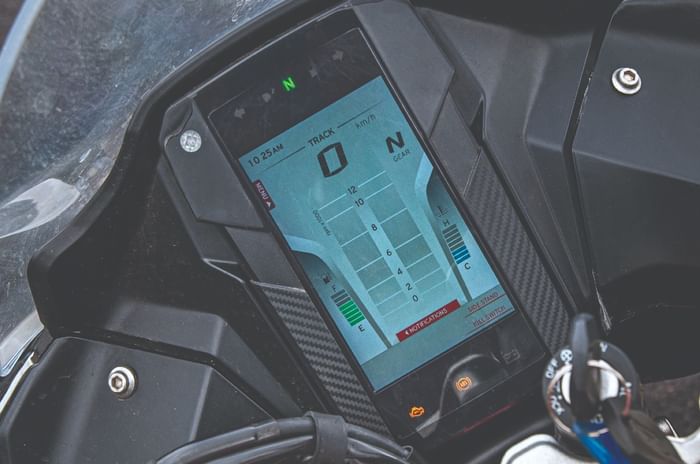
MOTOR CITY
You’ve heard it before and you’ll keep hearing it till electric vehicles take over completely – there simply is no replacement for displacement. The Apache has long had a handicap in the engine department – a 60cc deficit translates to a rather incredible handicap of almost 10hp and 10Nm to the KTM. So, of course, the RC is noticeably the quicker bike here. But when you wring them out, the difference isn’t quite as big as the numbers would have you believe, both on the VBox and from the saddle. The KTM is just over 1 second quicker to 100kph and in most real-world situations, the Apache can just about keep pace with it, although you do have to work its engine harder to hang in there. For everyday usage, though, the RC’s engine definitely feels meatier, and speed comes more effortlessly aboard the Austrian machine.
Aside from the somewhat similar performance levels, both motors have a distinct difference in character. The Apache’s strengths lie mostly in city use, where its tractable bottom-end makes it more fuss-free. It’s quite a smooth engine at low RPMs too, but as the speed and revs rise, the chinks in its armour crop up. This is quite a buzzy engine in the latter-half of the tachometer, and you feel the vibrations in the fuel tank, seat and foot pegs when pushing the engine hard – the RR feels considerably more busy at a 100kph cruise than the KTM. Throttle response could also improve on the Apache – in Sport and Track mode, where you have the full 34hp – the throttle feels quite snatchy and it’s hard to get a smooth off-on transition. Things are a lot better in Urban and Rain mode, but here, output is limited to about 26hp. On the flip side, the lower output figures mean the Apache is noticeably more fuel efficient in all situations.
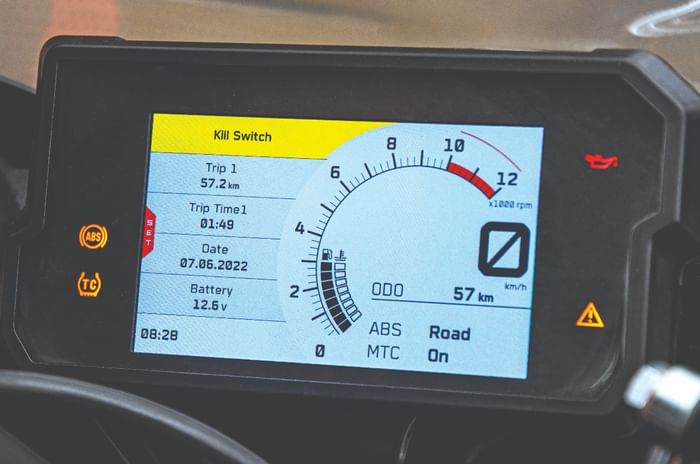
The RC’s motor feels like the big single that it is – it’s thumpy at idle and judders when you try to pull hard from low RPMs in high gears. But once past about 5,500rpm, it smoothens out considerably and remains that way till the redline. Delivery is certainly more linear than it used to be, but the KTM still isn’t quite as tractable and fuss-free off-idle as the Apache, and it’s in the mid-range where this engine feels most alive. Gearshifts also feel slicker on the KTM, and the bi-directional quickshifter is a real bonus here. It isn’t always super smooth and it isn’t always super slick – it works best at high RPMs and full throttle. But by and large, it works well enough that you can use it almost all of the time, which is a great convenience.
A TURN FOR THE BETTER
Both these bikes were built to gobble up twisties, and neither of them disappoints in this regard. These are both agile, sweet handling motorcycles that fill you with confidence the moment you climb aboard, and they effortlessly devour any corners you throw at them. But they do go about it slightly differently.
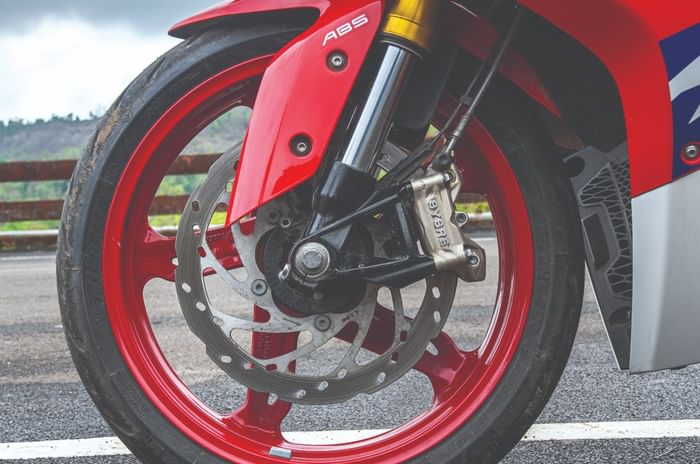
The Apache is a very quick steering motorcycle and it tips into corners rather effortlessly. As a result, it feels very light on its feet, and the mere thought of changing direction is enough to start subconsciously altering course. But once leaned over, the KTM sends you a little more feedback about what’s going on at the front contact patch, and that gives you a lot of confidence when pushing hard. Tyres on both bikes are more than adequate for road use, and they remain quite grippy even in the wet. But when pushed hard on track, the Michelin Road 5s on the Apache are a cut above the KTM’s H-rated Metzeler M5s.
One area where there is a more distinct difference is brakes, with the KTM sporting a considerably sharper and slightly more powerful braking set-up than the Apache’s, which feels rather numb at the lever. The Apache can stop well, but it requires a strong squeeze at the lever to make that happen.
FRIEND OR FOE?
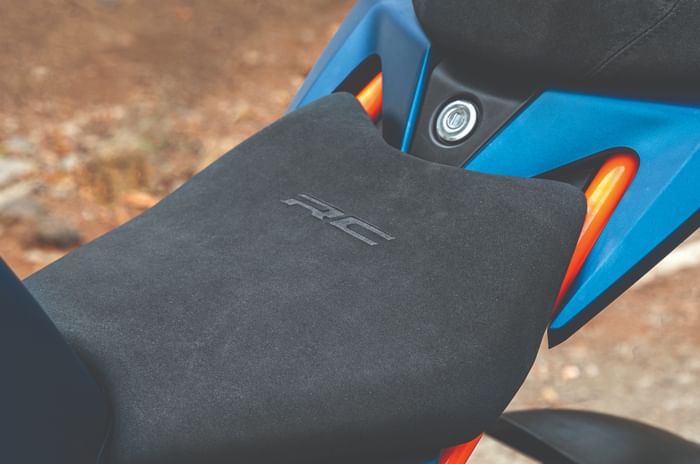
The RC 390’s performance levels have never been in doubt, but what has held it back in the past is usability and everyday comfort. This time around, KTM has made amends. First up, you’re seated noticeably more upright than on the previous RC. Despite that, it’s still a slightly more aggressive posture than the Apache, even though our Apache came with the optional Race kit installed. There’s more of a reach to the handlebars on the KTM, and taller riders will appreciate the fact that the RC is now roomier than before, and also more accommodating than the RR.
The KTM’s seat has also been significantly improved, and the shape, size and material are nicer than the Apache’s. This is why, despite the more leaned forward seating position, it’s the 390 that feels the more comfortable of these two over longer durations. The TVS has its handlebars slightly closer to you, and its seat height is lower too, so it will fit shorter riders better. But the tank is difficult to grip with your legs, and the slippery seat also keeps pushing you forward when slowing down.
Don’t expect to go two-up touring on either of these machines, but both have pillion seats that are pretty usable for short distances within the city – as long as your passengerisn’t prone to vertigo attacks. The RC’s pillion perch is considerably improved, and your passenger will no longer have to squat awkwardly like before.
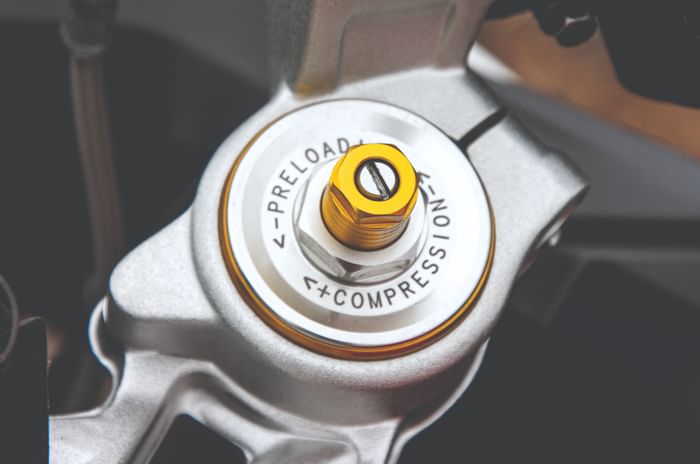
One of the Apache’s trump cards in this match-up is its optional Dynamic kit, which, in addition to a nice-looking brass-coated chain, also gives you adjustable suspension at both ends for just Rs12,000 extra. This is a very nice feature to have in this segment, and it’s truly commendable that TVS has managed to price it this reasonably. But truth be told, it’s the KTM that rides more comfortably out of the box, and even after we played around with the Apache’s suspension to get it as pliant as we could, we still felt that the KTM is more absorbent and comfortable on our roads.
The tunable window of the Apache’s suspension allows it to be very composed at high speeds or for aggressive cornering, but it does feel on the firm side in everyday usage, while the KTM’s damping rates are kinder and do a better job of isolating you from the road, without sacrificing high-speed stability or handling. Of course, the control and adjustability that the TVS offers will pay dividends on a racetrack, but most folks end up riding on the road most of the time. And for that purpose, the standard RR310’s suspension does its job well.
LOOK FAST TO GO FAST
Both these machines are the flagship offerings in their respective model line-ups, and they come with the bells and whistles to match that position in the market. The Apache got a big toy chest with its BS6 update, including a Bluetooth-enabled TFT display, four riding modes and ride-by-wire. The RC now also features a Bluetooth-equipped TFT, but it doesn’t get riding modes. What it does get (which the TVS doesn’t) is an ABS mode that allows you to turn off the system at the rear wheel. And it also ups the ante with new features like traction control, cornering ABS and a bi-directional quickshifter.
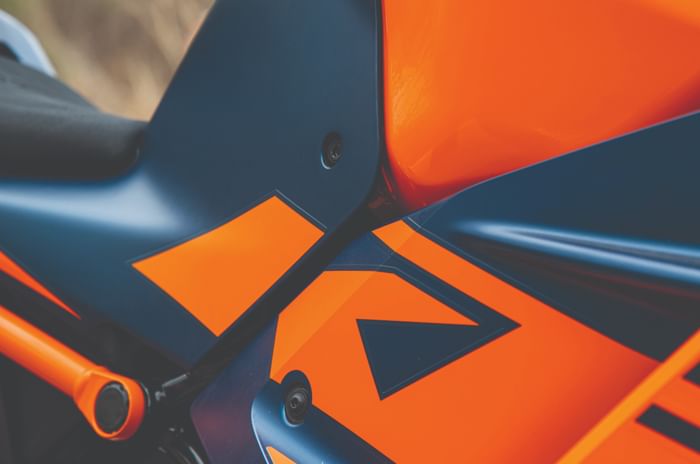
The quickshifter isn’t always super smooth and it isn’t always super quick – it works best at high RPMs and full throttle. But by and large, it works well enough that you can use it almost all of the time, which is a great convenience.
Where the TVS claws back some ground is in quality and finish levels. The materials used and the build quality across the bike are very pleasing, and it feels a definite notch above the KTM in this department. The RC is quite well put together for the most part and feels sturdy, but there are a few areas that feel a bit plasticky, and some of the panel gaps aren’t the neatest. To my eyes, the Apache seems to have the more conventionally pretty appearance, while the RC 390 is more striking to look at, even if not beautiful in the conventional sense. What’s without doubt is that both these machines grab their fair share of eyeballs and attract an incessant stream of questions wherever you stop.
WHICH STONE TO STEP ON?
Considering that the RC is now playing a little more of the Apache’s game, I expected these two motorcycles to be very closely matched this time around. And the sizeable price difference between the two should have made the decision-making process quite a challenge. The TVS Apache RR310 continues to have its strengths, and still comes across as a well-rounded package that offers great value for money, especially with where the KTM is now positioned. But with the arrival of this 2022 RC 390, the KTM now has a clear upper hand in most areas here, including some areas where the RR previously held the advantage. The updates to the little Austrian bike have made it easier to live with every day, without sacrificing its performance advantages on the days when you want to let loose.
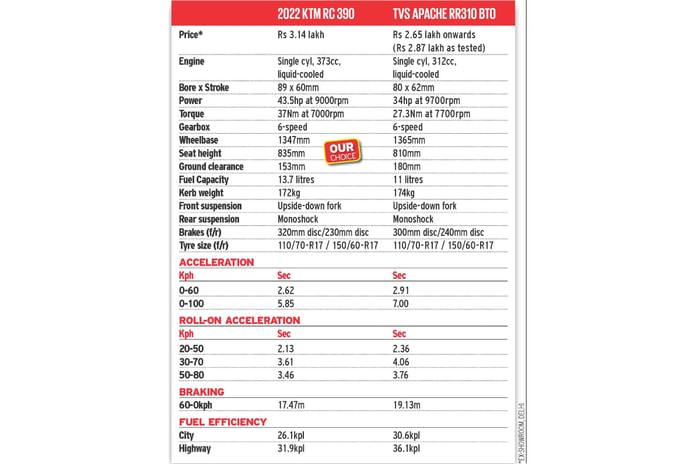
And what it demands in exchange is Rs 50,000 over the base-spec Apache and about Rs 30,000 over the fully equipped BTO version you see here. Is that a fair premium to command? In my mind, the answer to that is a convincing yes.







